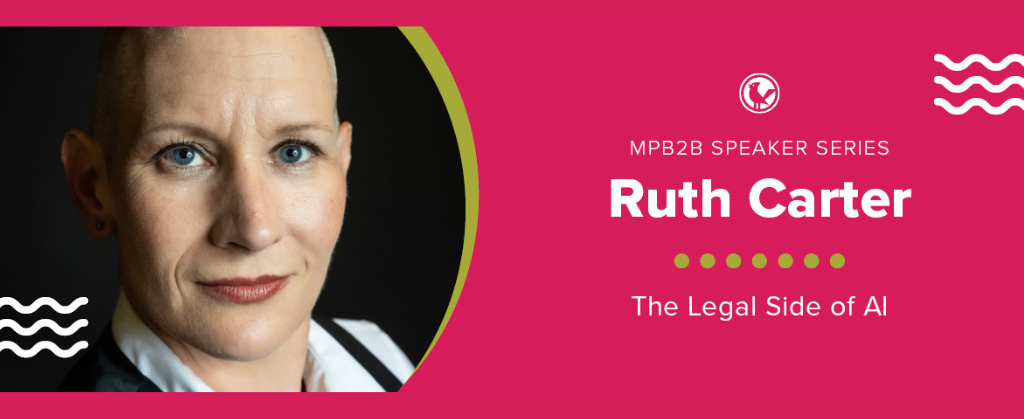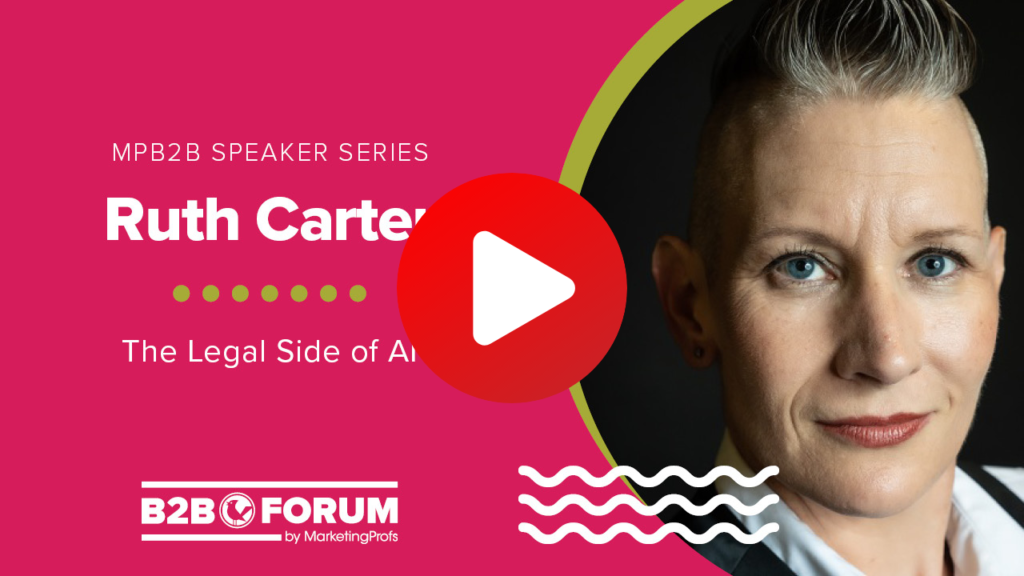
Marketers, as a group, are one of the largest adopters of generative AI tools like ChatGPT.
But what rights do you have over the content AI produces?
And how does that impact your use of that content?
In this clip from B2B Forum 2023, attorney Ruth Carter explains how copyright law applies to AI output and the legal concerns you may face when using AI.
For more on using AI in your marketing, join us at B2B Forum in Boston, November 2024. With six workshops, dozens of informative sessions, and inspirational keynotes from Ann Handley and others, B2B Forum is the place where B2B marketers like you move their career forward. Lock in your #MPB2B ticket and hotel room while prices are still low.

I am an attorney.
However, until you are paying me, I am not your attorney.
I am here today to provide general legal information. This is not a substitute for personalized legal advice. If you need legal advice, go hire somebody.

We good? We are good. Alright.
I will also warn you that the answer to almost every legal question starts with, “it depends.” If the law were black and white, you wouldn’t need people like me to explain it.
So if you want to turn that into a drinking game, feel free.
Okay, so let’s jump right into it.

How does this work with copyright?
Alright, so copyright is the rights you get in what you create. The requirements to get a copyright [are] very low in the US. All you need is an original work of authorship fixed in any tangible medium. That’s it.
So the amazing things you create are protected the same as the craptastic things that I create. Okay, not everything I create is crap, but you know what I mean.
So, copyright protects expression.
It doesn’t protect ideas. It doesn’t protect facts.
So, how does this play into AI?
Before I came to this conference, I asked chat GPT to write my out of office message, and I told it, “write me an out of office message in the style of a sassy evil villain.”
It did a decent job.
It was six paragraphs long.
I was like, “no one’s going to read that.” And so I tweaked it, and that’s what everyone’s seeing these days.
So the prompt that I put in, that was an idea. I don’t own what chat GPT pumped out. I own the copyright in any original expression I added to it before I put it on my email.

In the US we have well-decided, established—a long time ago, even before AI was what it is now—that there is no copyright in what the AI machine generates for you.
(And I use the term “AI machine” just because I’m just a very visual person and I picture it as an actual physical machine, not software. I also say “Google machine.”)

So there is no copyright.
And this was established a while ago in a somewhat infamous case of the monkey selfie.

So a photographer had his camera equipment out. This monkey came along and took a selfie. (Decent selfie actually for a monkey. Probably had no idea what they were doing!)
The photographer wanted to claim the copyright in it.
There was an animal rights group that tried to assert that, no, the monkey should own the rights because the monkey was the one who clicked the photo, which is how it would work when a human takes a photo.
And the court said, you’re both wrong. Only humans can own copyrights. And by humans, I mean, it has to have a substantial human involvement. So a company can own a copyright because a human was involved.
So that’s what the law says in the US currently.
So what happens when AI creates content?
There is no copyright. It immediately goes to public domain. Anybody can use it for any purpose without needing permission from you. That’s how it is in the US…
So what happens if you put somebody else’s protected work into the AI machine?
Don’t do that. We call that copyright infringement in my world.

If you put your own copyright protected work into the AI machine, the output is a derivative work. Because you own the copyright in what went in, you can assert rights in the derivative work that came out. Because as the copyright holder, you have the exclusive right to control how the work is copied, distributed, displayed, performed, and what derivative works can be made from it… including running it through an AI machine.
Somebody else’s copyright protected work? Don’t do that.
So I’ve talked about [the] US.
Well, other countries have made other decisions.

There are, so far, at least five countries where they will give you a copyright in what an AI created: Hong Kong, India, Ireland, New Zealand, UK.
I’m waiting for this to cause confusion. I’m waiting for there to be a situation where an AI machine… [produces] the same output for multiple people because they could put in similar inputs.
So somebody in New Zealand could put something in, [and] claim copyright in the output.
But somebody in the US could do the same thing, get basically the same output, they don’t get a copyright, and then New Zealand is calling the US saying, “hey, you’re stealing my stuff.”
It is going to get complicated, which means business for me. Yay. No, I don’t want business this way.
So I could see that happening.
I also could foresee somebody claiming that if the AI was running through a server in the UK, that they’re like, “oh, I can claim copyright because it had enough contact.”
And I was like, “oh, this could get messy.”
So we’ll see what happens. I’m a lawyer, not a psychic, but I could foresee either of those situations happening. We’ll see how it actually plays out.
Published March 27, 2024
B2B Forum is packed with marketing insights, strategies, and tactics taken from the real world experience of over forty industry experts, packaged into context you can actually put to use.
Join us in Boston for B2B Forum 2024 this coming November 12-14, 2024. Early buyers get B2B Forum tickets at their lowest rate, and discounted hotel rooms are available while they last.